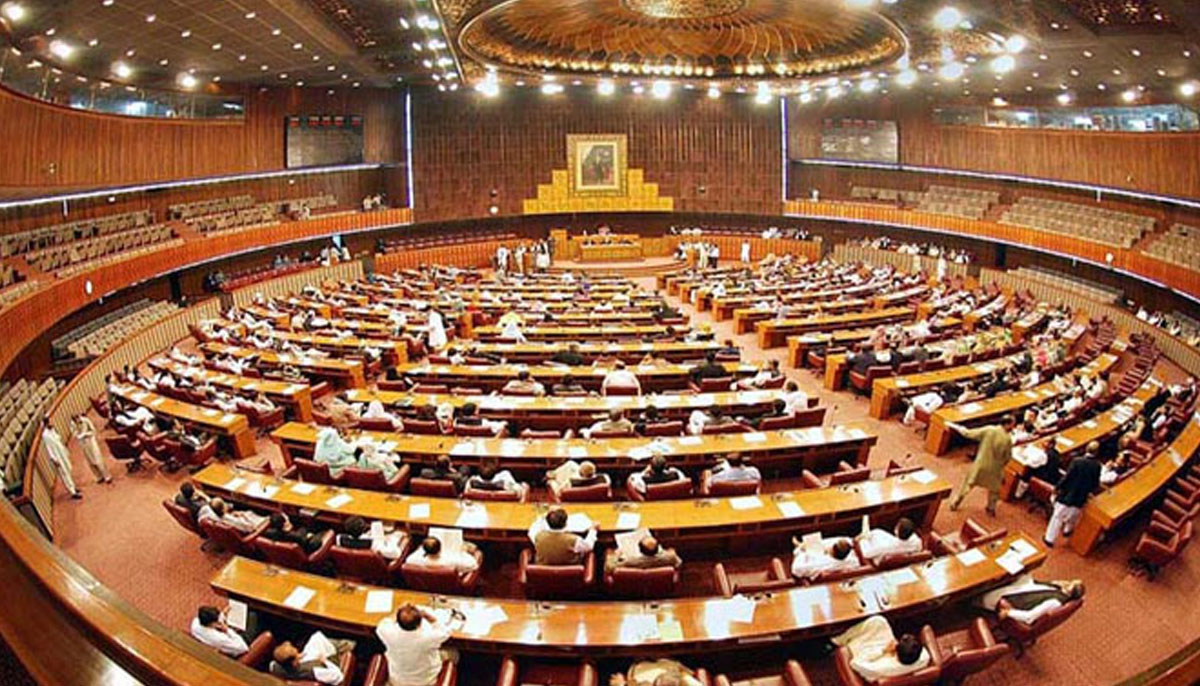Anti-money laundering law being extended to Waqf property
ISLAMABAD: The existing Anti-Money Laundering Act (AMLA), 2010, is being extended to every kind of information relating to waqf properties, which can now be scrutinised by international organisations including the Financial Action Task Force (FATF).
The Islamabad Capital Territory (ICT) Waqf Properties Bill, that was also rejected by the Senate along with the proposed amendments in the AMLA because of the government-opposition tussle, states that the waqf manager will, for domestic and international cooperation purposes, provide to the authorities at any time information regarding a waqf property. This includes but is not limited to the beneficial ownership of the property, the residences of the staff who have control over the waqf properties, any assets held or managed by a reporting entity [any person as defined in the AMLA] in relation to waqf property or any other information concerning the waqf as specified in AMLA, 2010.
Both the bills providing for amendments in the AMLA and waqf properties were passed by the National Assembly on Aug 26. They have been mandated by the FATF so that Pakistan can be excluded from the grey list. There was hardly any objection from the opposition parties to the waqf properties bill, but its approval was also held up in the dispute over the AMLA amendments.
Waqf is defined as an endowment made by a Muslim to a religious, educational, or charitable cause. The bill has been introduced for the purposes of management, supervision and administration of waqf properties in the ICT in order to enhance the effectiveness of the implementation of the federal government’s orders.
Under the proposed bill, the ICT chief commissioner will appoint a chief administrator auqaf for the ICT and may vest in him the waqf properties situated in the ICT including all rights, assets, debts, liabilities and obligations. No person will be appointed chief administrator unless he or she is a Muslim and a serving government servant of grade 19.
The chief administrator may take over and assume the administration, control, management and maintenance of a waqf property. However, during the lifetime of a waqif (a person who dedicates the waqf property), the chief administrator will not take over and assume the administrative control, management and maintenance of such waqf property except with the consent of such a person and on such terms and conditions as may be agreed upon between him and the chief administrator.
The chief administrator will provide upon request to the reporting entity information about the beneficial ownership and assets of the waqf, which may also obtain the information from the waqf manager about the beneficial owner, details of waqf assets, residential addresses of the waqf manager and details of beneficiaries.
The bill states that whoever obstructs or offers any resistance to, or impedes or otherwise interferes with any authority, officer or person exercising any power or performing any duty conferred or imposed upon it or him by or in pursuance of this law or otherwise discharging any lawful function under this law; or any person who is carrying out the orders of any such authority, officer or person who is otherwise acting in accordance with his duty in pursuance of the law, will be punished with imprisonment for a term which may extend to five years or with a fine of up to Rs25m or both.
Any person who willfully fails to comply with any requirement will be punished with imprisonment which will not be less than one year but which may extend to five years and will be liable to a fine that will not be less than the benefits derived from the waqf property but may extend to three times of the amount of income derived from the property. Any person who intentionally fails to comply with the provisions of the bill or intentionally conceals any information or provides incomplete or incorrect information to the chief administrator as required under this bill, will be liable to pay such an amount calculated by the concerned district collector or any other authority duly authorized by the chief administrator to do so, for the period of factum of waqf property or an imprisonment of up to five years, or both. The offences punishable under this bill will be tried by a sessions court.
If a property has been used from time immemorial for any purpose recognised by Islam as religious, pious or charitable, then in spite of there being no evidence of express dedication, it will be deemed to be a waqf property. Property allotted in lieu of or in exchange of waqf property left in India will also be deemed to be waqf property.
Property of any kind acquired with sale proceeds or in exchange of or from the income arising out of waqf property or from subscription raised for any purpose, recognised by Islam as religious, pious or charitable, will be deemed to be waqf property. The income from boxes placed at shrines and offerings, subscriptions or articles of any kind, description or use presented to a shrine or to any person at the premises of a shrine will be deemed to be waqf property.
-
 Sarah Pidgeon Explains Key To Portraying Carolyn Bessette Kennedy
Sarah Pidgeon Explains Key To Portraying Carolyn Bessette Kennedy -
 Justin Bieber Rocked The World With Bold Move 15 Years Ago
Justin Bieber Rocked The World With Bold Move 15 Years Ago -
 Sam Levinson Wins Hearts With Huge Donation To Eric Dane GoFundMe
Sam Levinson Wins Hearts With Huge Donation To Eric Dane GoFundMe -
 Kate Middleton Steps Out First Time Since Andrew Mountbatten-Windsor's Arrest
Kate Middleton Steps Out First Time Since Andrew Mountbatten-Windsor's Arrest -
 Inside Nicole 'Snooki' Polizzi's 'private' Marriage With Husband Jionni LaValle Amid Health Scare
Inside Nicole 'Snooki' Polizzi's 'private' Marriage With Husband Jionni LaValle Amid Health Scare -
 Germany’s Ruling Coalition Backs Social Media Ban For Children Under 14
Germany’s Ruling Coalition Backs Social Media Ban For Children Under 14 -
 Meghan Markle Shuts Down Harry’s Hopes Of Reconnecting With ‘disgraced’ Uncle
Meghan Markle Shuts Down Harry’s Hopes Of Reconnecting With ‘disgraced’ Uncle -
 Liza Minnelli Alleges She Was Ordered To Use Wheelchair At 2022 Academy Awards
Liza Minnelli Alleges She Was Ordered To Use Wheelchair At 2022 Academy Awards -
 Quinton Aaron Reveals Why He Does Not Want To Speak To Wife Margarita Ever Again
Quinton Aaron Reveals Why He Does Not Want To Speak To Wife Margarita Ever Again -
 Prince William And Kate's Photos With Andrew Used In New Campaign Against Royals
Prince William And Kate's Photos With Andrew Used In New Campaign Against Royals -
 Touching Eric Dane Moment With Daughter Emerges After Viral Final Words
Touching Eric Dane Moment With Daughter Emerges After Viral Final Words -
 Kate Middleton Quietly Backs Princess Beatrice, Eugenie As Andrew Scandal Intensifies
Kate Middleton Quietly Backs Princess Beatrice, Eugenie As Andrew Scandal Intensifies -
 Michael B. Jordan Shares His Thoughts On Growing Trend Of Live-action Anime Adaptations
Michael B. Jordan Shares His Thoughts On Growing Trend Of Live-action Anime Adaptations -
 Why Mikaela Shiffrin Celebrated Olympic Gold With Taylor Swift Song?
Why Mikaela Shiffrin Celebrated Olympic Gold With Taylor Swift Song? -
 Andrew Mountbatten-Windsor Was Mentioned In Epstein Email Sent Before His Death
Andrew Mountbatten-Windsor Was Mentioned In Epstein Email Sent Before His Death -
 'Dump Eugenie And Beatrice': Andrew's Daughters Face Backlash After His Arrest
'Dump Eugenie And Beatrice': Andrew's Daughters Face Backlash After His Arrest




